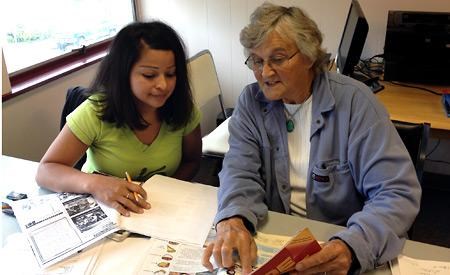Have you ever considered what it would be like if you couldn’t read well enough to understand a newspaper article? Have you thought about what it would be like if you had a difficult time using a computer to do a simple task like emailing someone? Or if you couldn’t do math well enough to figure out a reliable household budget?
In British Columbia those scenarios are true for about 40 per cent of the population. Literacy—or the lack thereof—is a problem in this province, and it’s threatening our collective future.
“What?” you may think. “I don’t know anyone who can’t read and write.” That may be true, but in this day and age literacy is not only defined by being “able” to read and write. It includes skills like comprehension and critical thinking, communication and using technology. All of these skills help us to function well in our communities and our daily lives, and without them we are not meeting our full potential.
September 8 is International Literacy Day, a day that the United Nations Educational, Scientific and Cultural Organization (UNESCO) designated to remind the world that literacy is a right and a foundation for lifelong learning, better well-being and livelihoods.
“Literacy is much more than an educational priority — it is the ultimate investment in the future and the first step towards all the new forms of literacy required in the 21st century,” says Irina Bokova, Director General of UNESCO.
Indeed, literacy is something that affects each and every one of us throughout our lives. For the last couple of years, Powell River Literacy Council has been working to communicate the message that literacy is not just about reading and writing, and it’s not just for children. It’s about continuous, lifelong learning, and it’s a journey that never ends.
“People often associate literacy improvement with those who cannot read and write at all, people who have fallen through the cracks at some point in their lives,” says Literacy Outreach Coordinator Emma Levez Larocque. “But we can all improve our literacy; we all have areas that we can strengthen, or things we would like to learn more about. When we embrace that concept as individuals and as a community, we move towards a culture of learning, and that’s good for all of us.”
As September rolls around two key Powell River literacy programs that are based at The Learning Centre above the Bank of Montreal on Marine Avenue are picking up after the lazy days of summer. Community Adult Literacy and Learning (CALL), which pairs tutors and adult learners one-on-one, is looking for more volunteers, and always more people who are interested in improving their skills.
English Second Language Settlement Assistance Program (ESLSAP) will also be starting up weekly classes and programming. This program is also constantly looking for new volunteers and learners. ESLSAP provides English language tutoring and immigrant services for permanent residents, refugees, naturalized Canadian citizens, PNP (Provincial Nominee Program) applicants and people applying to stay in Canada. Both CALL and ESLSAP provide free training for tutors and there are no fees for services for learners.
There are plenty of other learning programs and literacy services in the community as well. Readers can visit www.powellriverliteracy.ca for a complete list of services and programs, or Powell River Literacy Council on facebook to be kept up to date with literacy news, events and more.



